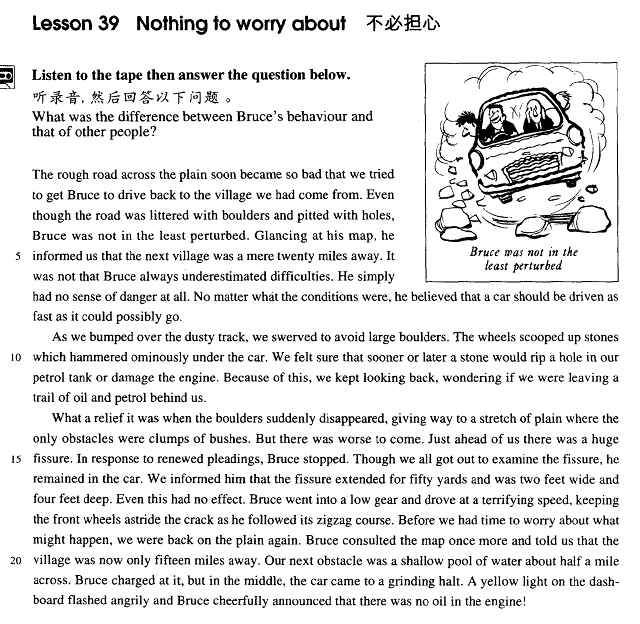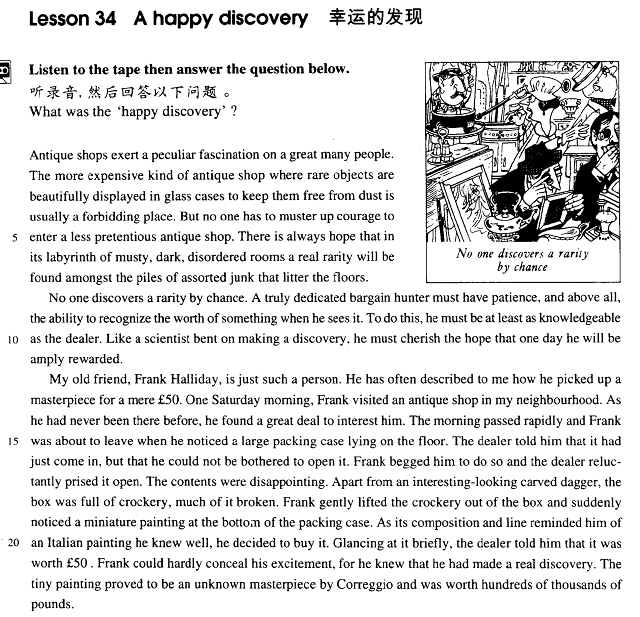Lesson 40 Who's who 真假难辨 NCE340
Lesson 40 Who's who 真假难辨
谁也弄不清为什么大学生好像比任何人都更喜欢恶作剧。大学生擅长一种特殊的恶作剧——戏弄人。请消防队来扑灭一场根本没有的大火是一种低级骗局,有自尊心的大学生决不会去做。大学生们常常做的是制造一种可笑的局面,使大家笑上一场,当然受害者是笑不出来的。
最近有个学生看见两个工人在大学校门外用风钻干活,马上打电话报告警察,说有两个学生装扮成工人,正在用风钻破坏路面。挂上电话后,他又马上来到工人那儿,告诉他们若有个警察来让他们走开,不要把他当回事;还对工人说,有个学生常装扮成警察无聊地同别人开玩笑。警察与工人都对那个学生事先通报情况表示感谢。
那学生躲在附近一拱形门廊里,在那儿可以看见、听到现场发生的一切。果然,警察来了,有礼貌地请工人离开此地;但其中一个工人粗鲁地回了几句。于是警察威胁要强行使他们离开。工人说,悉听尊便。警察去打电话叫人。一会儿工夫,又来了4个警察,规劝工人离开。由于工人拒绝停下手中的活,警察想夺风钻。两个工人奋力抗争,其中一个发了火,威胁说要去叫警察。警察听后讥讽地说,这大可不必,因为他俩已被逮捕了。其中一个工人装模作样地问道,在被带往警察局之前,是否可以打一个电话。警察同意了,陪他来到一个投币电话前。当他看到那个工人真的是给警察挂电话,才恍然大悟,原来他们都成了一场骗局的受害者。
It has never been explained why university students seem to enjoy practical jokes more than anyone else. Students specialize in a particular type of practical joke: the hoax. Inviting the fire brigade to put out a nonexistent fire is a crude form of deception which no self-respecting student would ever indulge in. Students often create amusing situations which are funny to everyone except the victims.
When a student recently saw two workmen using a pneumatic drill outside his university, he immediately telephoned the police and informed them that two students dressed up as workmen were tearing up the road with a pneumatic drill. As soon as he had hung up, he went over to the workmen and told them that if a policeman ordered them to go away, they were not to take him seriously. He added that a student had dressed up as a policeman and was playing all sorts of silly jokes on people. Both the police and the workmen were grateful to the student for this piece of advance information.
The student hid in an archway nearby where he could watch and hear everything that went on. Sure enough, a policeman arrived on the scene and politely asked the workmen to go away. When he received a very rude reply from one of the workmen, he threatened to remove them by force. The workmen told him to do as he pleased and the policeman telephoned for help. Shortly afterwards, four more policemen arrived and remonstrated with the workmen. As the men refused to stop working, the police attempted to seize the pneumatic drill. The workmen struggled fiercely and one of them lost his temper. He threatened to call the police. At this, the police pointed out ironically that this would hardly be necessary as the men were already under arrest. Pretending to speak seriously, one of the workmen asked if he might make a telephone call before being taken to the station. Permission was granted and a policeman accompanied him to a pay phone. Only when he saw that the man was actually telephoning the police did he realize that they had all been the victims of a hoax.
标签: NCE3
































